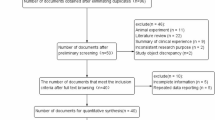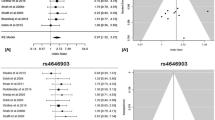Abstract
Lung cancer is the leading cause of cancer-related death in the world. Several genome-wide association studies (GWAS) have identified TERT-CLPTM1L as plausible causative locus for lung cancer development. This study aimed to investigate the associations of genetic variations in TERT-CLPTM1L and the expression level of TERT with the survival of early stage non-small cell lung cancer (NSCLC) patients. We selected three single-nucleotide polymorphisms of TERT-CLPTM1L (rs2853669, rs2736108 and rs31490) and genotyped in 140 early stage NSCLC patients by TaqMan assay. Associations between these variations and survival outcome of early stage NSCLC patients were further investigated. We also used TCGA data to evaluate the associations of TERT messenger RNA (mRNA) expression and survival outcome of early stage NSCLC patients. Survival analysis showed that, compared with early NSCLC patients carrying TERT rs2853669 TT+TC genotypes, patients with rs2853669 CC genotype had significantly longer median survival time (MST=102.2 vs 52.4 months; log-rank P=0.028) and lower death risk [hazard ratio (HR) with 95% confidence interval (CI))=0.38(0.17–0.82), P=0.014]. Early NSCLC patients carrying TERT rs2736108 AA genotype had significantly shorter MST (MST=29.0 vs 63.3 months; log-rank P=0.020) and increased death risk [HR (95% CI)=2.22(1.01–5.80), P=0.046], when compared with patients carrying rs2736108 GG genotypes. TCGA data revealed that early NSCLC patients with higher expression level of TERT mRNA in lung tumor tissues had a longer MST and decreased death risk than those with low expression level of TERT mRNA [MST=54.4 vs 49.0 months; log-rank P=0.041; adjusted HR (95% CI)=0.68(0.50–0.94)]. These findings may add potential evidence to understand the prognostic value of TERT and provide a new prospect of individualized prevention and treatment for early stage NSCLC.
This is a preview of subscription content, access via your institution
Access options
Subscribe to this journal
Receive 12 print issues and online access
$259.00 per year
only $21.58 per issue
Buy this article
- Purchase on Springer Link
- Instant access to full article PDF
Prices may be subject to local taxes which are calculated during checkout

Similar content being viewed by others
References
Siegel RL, Miller KD, Jemal A . Cancer statistics, 2015. CA Cancer J Clin 2015; 65: 5–29.
Hoffman PC, Mauer AM, Vokes EE . Lung cancer. Lancet 2000; 355: 479–485.
McKay JD, Hung RJ, Gaborieau V, Boffetta P, Chabrier A, Byrnes G et al. Lung cancer susceptibility locus at 5p15.33. Nat Genet 2008; 40: 1404–1406.
Broderick P, Wang Y, Vijayakrishnan J, Matakidou A, Spitz MR, Eisen T et al. Deciphering the impact of common genetic variation on lung cancer risk: a genome-wide association study. Cancer Res 2009; 69: 6633–6641.
Landi MT, Chatterjee N, Yu K, Goldin LR, Goldstein AM, Rotunno M et al. A genome-wide association study of lung cancer identifies a region of chromosome 5p15 associated with risk for adenocarcinoma. Am J Hum Genet 2009; 85: 679–691.
Zhong R, Liu L, Zou L, Zhu Y, Chen W, Zhu B et al. Genetic variations in TERT-CLPTM1L locus are associated with risk of lung cancer in Chinese population. Mol Carcinog 2013; 52 (Suppl 1): E118–E126.
Lantuejoul S, Soria JC, Moro-Sibilot D, Morat L, Veyrenc S, Lorimier P et al. Differential expression of telomerase reverse transcriptase (hTERT) in lung tumours. Br J Cancer 2004; 90: 1222–1229.
Blasco MA . Telomeres and human disease: ageing, cancer and beyond. Nat Rev Genet 2005; 6: 611–622.
Ghosh A, Saginc G, Leow SC, Khattar E, Shin EM, Yan TD et al. Telomerase directly regulates NF-kappaB-dependent transcription. Nat Cell Biol 2012; 14: 1270–1281.
Choi J, Southworth LK, Sarin KY, Venteicher AS, Ma W, Chang W et al. TERT promotes epithelial proliferation through transcriptional control of a Myc- and Wnt-related developmental program. PLoS Genet 2008; 4: e10.
Ni Z, Tao K, Chen G, Chen Q, Tang J, Luo X et al. CLPTM1L is overexpressed in lung cancer and associated with apoptosis. PLoS One 2012; 7: e52598.
James MA, Wen W, Wang Y, Byers LA, Heymach JV, Coombes KR et al. Functional characterization of CLPTM1L as a lung cancer risk candidate gene in the 5p15.33 locus. PLoS One 2012; 7: e36116.
James MA, Vikis HG, Tate E, Rymaszewski AL, You M . CRR9/CLPTM1L regulates cell survival signaling and is required for Ras transformation and lung tumorigenesis. Cancer Res 2014; 74: 1116–1127.
Yamamoto K, Okamoto A, Isonishi S, Ochiai K, Ohtake Y . A novel gene, CRR9, which was up-regulated in CDDP-resistant ovarian tumor cell line, was associated with apoptosis. Biochem Biophys Res Commun 2001; 280: 1148–1154.
Zhao X, Wang S, Wu J, Li X, Wang X, Gao Z et al. Association of TERT polymorphisms with clinical outcome of non-small cell lung cancer patients. PLoS One 2015; 10: e0129232.
Azad AK, Qiu X, Boyd K, Kuang Q, Emami M, Perera N et al. A genetic sequence variant (GSV) at susceptibility loci of 5p15.33 (TERT-CLPTM1L) is associated with survival outcome in locally advanced and metastatic non-small-cell lung cancer (NSCLC). Lung Cancer 2014; 84: 289–294.
Marchetti A, Pellegrini C, Buttitta F, Falleni M, Romagnoli S, Felicioni L et al. Prediction of survival in stage I lung carcinoma patients by telomerase function evaluation. Lab Invest 2002; 82: 729–736.
Hara H, Yamashita K, Shinada J, Yoshimura H, Kameya T . Clinicopathologic significance of telomerase activity and hTERT mRNA expression in non-small cell lung cancer. Lung Cancer 2001; 34: 219–226.
Zhu CQ, Cutz JC, Liu N, Lau D, Shepherd FA, Squire JA et al. Amplification of telomerase (hTERT) gene is a poor prognostic marker in non-small-cell lung cancer. Br J Cancer 2006; 94: 1452–1459.
Komiya T, Kawase I, Nitta T, Yasumitsu T, Kikui M, Fukuoka M et al. Prognostic significance of hTERT expression in non-small cell lung cancer. Int J Oncol 2000; 16: 1173–1177.
Wang L, Soria JC, Kemp BL, Liu DD, Mao L, Khuri FR . hTERT expression is a prognostic factor of survival in patients with stage I non-small cell lung cancer. Clin Cancer Res 2002; 8: 2883–2889.
Fujita Y, Fujikane T, Fujiuchi S, Nishigaki Y, Yamazaki Y, Nagase A et al. The diagnostic and prognostic relevance of human telomerase reverse transcriptase mRNA expression detected in situ in patients with nonsmall cell lung carcinoma. Cancer 2003; 98: 1008–1013.
Metzger R, Vallbohmer D, Muller-Tidow C, Higashi H, Bollschweiler E, Warnecke-Eberz U et al. Increased human telomerase reverse transcriptase (hTERT) mRNA expression but not telomerase activity is related to survival in curatively resected non-small cell lung cancer. Anticancer Res 2009; 29: 1157–1162.
Wu TC, Lin P, Hsu CP, Huang YJ, Chen CY, Chung WC et al. Loss of telomerase activity may be a potential favorable prognostic marker in lung carcinomas. Lung Cancer 2003; 41: 163–169.
Lu C, Soria JC, Tang X, Xu XC, Wang L, Mao L et al. Prognostic factors in resected stage I non-small-cell lung cancer: a multivariate analysis of six molecular markers. J Clin Oncol 2004; 22: 4575–4583.
Arinaga M, Shimizu S, Gotoh K, Haruki N, Takahashi T, Takahashi T et al. Expression of human telomerase subunit genes in primary lung cancer and its clinical significance. Ann Thorac Surg 2000; 70: 401–405 discussion 405-6.
Wittekind C . 2010 TNM system: on the 7th edition of TNM classification of malignant tumors. Pathologe 2010; 31: 331–332.
Tregouet DA, Garelle V . A new JAVA interface implementation of THESIAS: testing haplotype effects in association studies. Bioinformatics 2007; 23: 1038–1039.
Zakian VA . Telomeres: beginning to understand the end. Science 1995; 270: 1601–1607.
Artandi SE, Attardi LD . Pathways connecting telomeres and p53 in senescence, apoptosis, and cancer. Biochem Biophys Res Commun 2005; 331: 881–890.
Feldser DM, Hackett JA, Greider CW . Telomere dysfunction and the initiation of genome instability. Nat Rev Cancer 2003; 3: 623–627.
Artandi SE, DePinho RA . Telomeres and telomerase in cancer. Carcinogenesis 2010; 31: 9–18.
Weischer M, Nordestgaard BG, Cawthon RM, Freiberg JJ, Tybjaerg-Hansen A, Bojesen SE . Short telomere length, cancer survival, and cancer risk in 47102 individuals. J Natl Cancer Inst 2013; 105: 459–468.
Fernandez-Marcelo T, Gomez A, Pascua I, de Juan C, Head J, Hernando F et al. Telomere length and telomerase activity in non-small cell lung cancer prognosis: clinical usefulness of a specific telomere status. J Exp Clin Cancer Res 2015; 34: 78.
Frias C, Garcia-Aranda C, De Juan C, Moran A, Ortega P, Gomez A et al. Telomere shortening is associated with poor prognosis and telomerase activity correlates with DNA repair impairment in non-small cell lung cancer. Lung Cancer 2008; 60: 416–425.
Hsu CP, Hsu NY, Lee LW, Ko JL . Ets2 binding site single nucleotide polymorphism at the hTERT gene promoter–-effect on telomerase expression and telomere length maintenance in non-small cell lung cancer. Eur J Cancer 2006; 42: 1466–1474.
Shen J, Gammon MD, Terry MB, Bradshaw PT, Wang Q, Teitelbaum SL et al. Genetic polymorphisms in telomere pathway genes, telomere length, and breast cancer survival. Breast Cancer Res Treat 2012; 134: 393–400.
Mosrati MA, Willander K, Falk IJ, Hermanson M, Hoglund M, Stockelberg D et al. Association between TERT promoter polymorphisms and acute myeloid leukemia risk and prognosis. Oncotarget 2015; 6: 25109–25120.
Mosrati MA, Malmstrom A, Lysiak M, Krysztofiak A, Hallbeck M, Milos P et al. TERT promoter mutations and polymorphisms as prognostic factors in primary glioblastoma. Oncotarget 2015; 6: 16663–16673.
Spiegl-Kreinecker S, Lotsch D, Ghanim B, Pirker C, Mohr T, Laaber M et al. Prognostic quality of activating TERT promoter mutations in glioblastoma: interaction with the rs2853669 polymorphism and patient age at diagnosis. Neuro Oncol 2015; 17: 1231–1240.
Ko E, Seo HW, Jung ES, Kim BH, Jung G . The TERT promoter SNP rs2853669 decreases E2F1 transcription factor binding and increases mortality and recurrence risks in liver cancer. Oncotarget 2016; 7: 684–699.
Hosen I, Rachakonda PS, Heidenreich B, de Verdier PJ, Ryk C, Steineck G et al. Mutations in TERT promoter and FGFR3 and telomere length in bladder cancer. Int J Cancer 2015; 137: 1621–1629.
Hosen I, Rachakonda PS, Heidenreich B, Sitaram RT, Ljungberg B, Roos G et al. TERT promoter mutations in clear cell renal cell carcinoma. Int J Cancer 2015; 136: 2448–2452.
Beesley J, Pickett HA, Johnatty SE, Dunning AM, Chen X, Li J et al. Functional polymorphisms in the TERT promoter are associated with risk of serous epithelial ovarian and breast cancers. PLoS One 2011; 6: e24987.
Acknowledgements
This study was supported by the funds from the National Natural Science Foundation of China (grant no. 81272589), Program for New Century Excellent Talents in University (grant no. NCET-12-0209) and Foundation for the Author of National Excellent Doctoral Dissertation of the People’s Republic of China (grant no. 2014084).
Author information
Authors and Affiliations
Corresponding authors
Ethics declarations
Competing interests
The authors declare no conflict of interest.
Rights and permissions
About this article
Cite this article
Chen, Z., Wang, J., Bai, Y. et al. The associations of TERT-CLPTM1L variants and TERT mRNA expression with the prognosis of early stage non-small cell lung cancer. Cancer Gene Ther 24, 20–27 (2017). https://doi.org/10.1038/cgt.2016.74
Received:
Revised:
Accepted:
Published:
Issue Date:
DOI: https://doi.org/10.1038/cgt.2016.74
This article is cited by
-
CLPTM1L induces estrogen receptor β signaling-mediated radioresistance in non-small cell lung cancer cells
Cell Communication and Signaling (2020)



